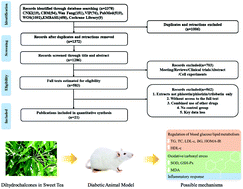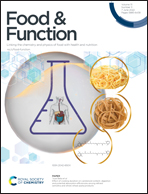Effects of natural dihydrochalcones in sweet tea (Lithocarpus polystachyus) on diabetes: a systematical review and meta-analysis of animal studies
Abstract
Sweet tea (Lithocarpus polystachyus Rehd.), a natural functional food highly rich in dihydrochalcones including trilobatin, phlorizin and phloretin, is reported to possess numerous biological activities especially for treating diabetes. Here, the aim of this systematical review and meta-analysis is to assess the effect of dihydrochalcones in sweet tea (DST) on diabetes and summarize their possible mechanisms. We searched in eight databases including Embase, PubMed, Cochrane, Web of Science, WanFang database, VIP database, China National Knowledge Infrastructure and China Biology Medicine from Jan 2000 to Nov 2021 and ultimately included 21 animal studies in this review. A total of 10 outcome measurements including blood lipid indexes, blood glucose, insulin resistance indicators and oxidative stress biomarkers were extracted for meta-analysis using RevMan 5.4 software. DST significantly decreased the levels of triglyceride (TG), total cholesterol (TC), low-density lipoprotein cholesterol (LDL-c), blood glucose (BG), homeostasis model assessment of insulin resistance (HOMA-IR) and malondialdehyde (MDA), and increased high-density lipoprotein cholesterol (HDL-c), superoxide dismutase (SOD) and glutathione peroxidase (GSH-Px) activity in diabetic animal models. In summary, DST could treat diabetes by regulation of blood glucose/lipid metabolism, oxidative/carbonyl stress, inflammatory response etc.

- This article is part of the themed collection: Food & Function Review Articles 2022


 Please wait while we load your content...
Please wait while we load your content...